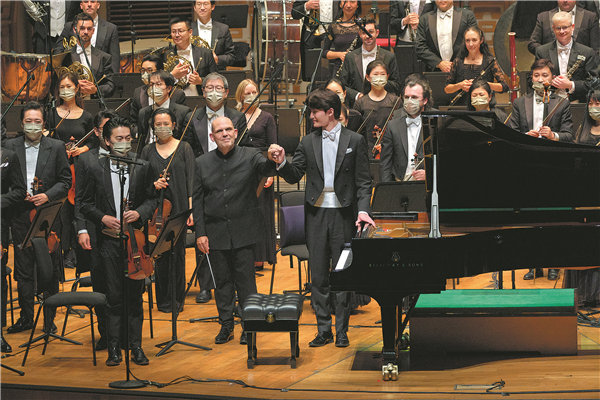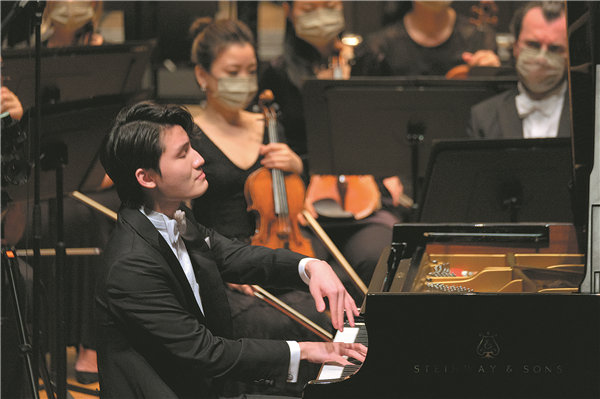
Pianist Niu Niu performs with the Hong Kong Philharmonic Orchestra under the baton of conductor Jaap van Zweden at the Hong Kong Cultural Centre Concert Hall on Dec 16, 2022. [Photo provided to China Daily]
Classical musician Niu Niu is maturing beyond the talent of his youth as his mindset and skill set progress in tandem, Chen Nan reports.
He learned to play the piano at 3 years old. He gave his first recital at age 6. And by 9, he became the youngest pianist ever signed to the international label, EMI Classics. Since then, he has released nine albums. Zhang Shengliang, who's better known by his stage name, Niu Niu, is often described as a child prodigy. He was born into a musical family in Xiamen, Fujian province, 27 years ago.
"I can tell people that I have 20 years of experience of being a pianist," he says, laughing.
But he's still breaking new ground. On April 26, the pianist released his latest album, Tchaikovsky: Piano Concerto No 1 and Symphony No 6.
It was recorded in collaboration with the Hong Kong Philharmonic Orchestra and its artistic director, conductor Jaap van Zweden. The recording was produced and engineered by Phil Rowlands and released by Decca Records under Universal Music Group.
It is Niu Niu's first live recording and features his performances with the Hong Kong orchestra on Dec 16 and 17, 2022.
"In my previous experience in making albums, I usually sat alone in the studio and recorded the pieces with the help of sound engineers and producers. For this live concert recording, I didn't know what to expect. I was nervous and excited," says Niu Niu, who trained at the Shanghai Conservatory of Music and later on a full scholarship at the Juilliard School in New York, from which he graduated in 2018.
"There were about 2,000 audience members in the concert hall. Once I started playing the music piece, I forgot about the recording and fully immersed myself in the space," he says.
"After the first concert, I couldn't wait to listen to the recording. It was great because of the presence of the audience. I felt like I was talking with them through the musical interpretation rather than talking to the air when I did recordings alone in the studio."
Niu Niu played Tchaikovsky's Piano Concerto No 1 when he was a child. Over 10 years ago, he played the music piece with the Shanghai Philharmonic Orchestra under the baton of conductor Tang Muhai. In 2015, he played the same piece during his first collaboration with the Hong Kong Philharmonic Orchestra. This month, he will embark on a tour in Japan to promote this new album by performing in Osaka and Tokyo.
He loves the work and especially the sequence of pounding chords with which the pianist launches the piece's first movement. He also enjoys the charming flute solo that introduces a lush piano melody in the second movement, which allows the pianist to settle into deeper exchanges with the orchestra.

He plays Tchaikovsky's Piano Concerto No 1 during the concert in Hong Kong. [Photo provided to China Daily]
"The music piece is well-measured with all that melody, emotion and drama. It's a favorite piano concerto for many pianists, including me," says Niu Niu. "When I was younger, I concentrated on showing off dazzling skills, but now I want to go deeper and deliver more information about the music piece, like warmth and generosity."
Maestro Van Zweden, who worked with the pianist for the first time during the concerts in 2022, says: "I was impressed with his passion, music making and dedication. The way he interpreted Tchaikovsky's masterpiece truly captured the soul of the music. It was a wonderful opportunity to blend Niu Niu's talent with the orchestra's distinct sound in this masterpiece, creating an exceptional and memorable performance. The experience of working together with Niu Niu was fantastic, and I enjoyed every moment of it."
Niu Niu's latest album also features Tchaikovsky's sixth symphony, recorded live by the Hong Kong Philharmonic Orchestra, conducted by Van Zweden. The piece, which is also known as Pathetique Symphony, is the last of Tchaikovsky's six numbered symphonies. It's marked by diverse emotions and vitalized energy.
The conductor also says that, compared with studio recordings, live recordings can help convey the excitement of a live concert to the listeners.
"Live recordings capture the distinct acoustics of the concert hall. The organic, one-of-a-kind sound of a live performance adds to the magic of the experience," the conductor says.
For the past decade, Niu Niu has maintained the habit of reviewing his performances by listening to recordings and watching videos. It's a way, he says, to be objective about his music and to consequently progress.
"I also meditate every night, which offers me moments of great solitude and helps me to slow down and concentrate on myself," Niu Niu adds.
Although classically trained, Niu Niu isn't satisfied to remain just a concert pianist. During the pandemic, he got to spend more time at home and go deeper into composition.
In 2021, he released the album, Faith and Hope, featuring the piece, Hope, that he'd composed during the pandemic.
Soon after releasing Faith and Hope, he began work on the album, Lifetime. He chose 17 short pieces by 17 composers from around the world to express 17 feelings, such as joy, anger, hatred and sorrow. He included his own arrangement of the well-known Christian hymn, Amazing Grace. Lifetime also features Niu Niu's compositional piece, Impromptu No 2 Miss, which he dedicated to a friend who died during the pandemic.
"Composing my own works enables me to better understand the composers and to likewise better express the meaning of pieces by other composers," says Niu Niu.
Last year, the pianist had a small ceremony in his hometown, Xiamen, to mark the 20th anniversary of his music career. Indeed, he's known no other calling than playing piano, he says.
The musician says he has experienced a period of time during his college years when he felt very nervous about performing onstage. Now, he says, he feels very determined and assured when he performs.
"I'm using the piano to make music. I use my hands and my 10 fingers to work with the 88 keys on the piano to share different feelings with people who listen to my music," he says.
"That's what being a musician means to me now."